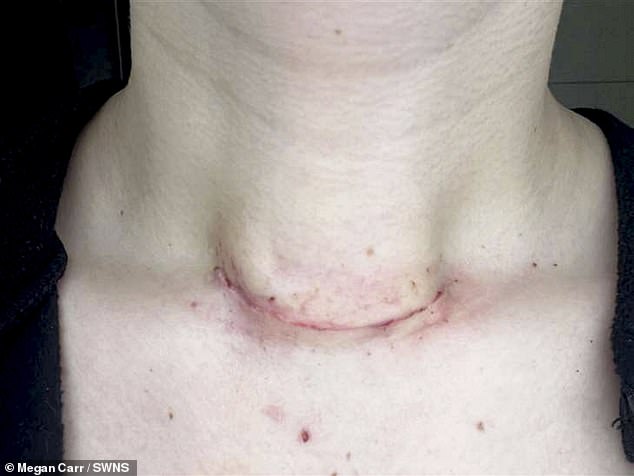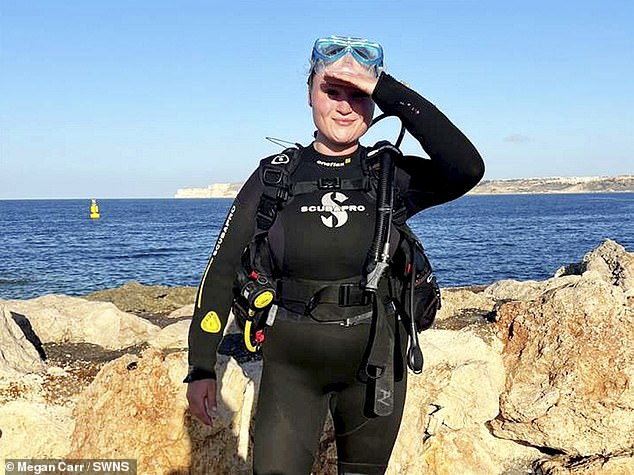A young woman who thought a lump on her neck was a reaction to swimming in the sea was left shocked when it turned out to be a rare form of cancer.
Megan Carr, 24, was on a family holiday in Spain in July when her father noticed she had a lump growing in her neck.
She had no other symptoms and was not feeling unwell so assumed she had simply had a reaction to saltwater or been stung while swimming.
However, the lump was still in her neck by the time she had travelled back to her home in Faversham, Kent, which prompted her to visit her GP.
After months of tests, doctors decided the best course of action was to remove part of Megan’s thyroid.
She underwent surgery in October and a biopsy was taken which revealed she had a rare form of cancer – papillary thyroid carcinoma (PTC).
Images show the woman at William Harvey Hospital in Ashford, Kent, with a drain in her neck following the surgeries.
But Megan, a journalist, just couldn’t believe the diagnosis – as she had no other symptoms and felt so healthy.

A young woman who thought a lump on her neck was a reaction to swimming in the sea was ‘shocked’ to instead be diagnosed with a rare cancer

The lump on Megan Carr’s throat was papillary thyroid cancer

Megan Carr’s neck a week after her second surger
She said: ‘It was just so bizarre. I was shocked. I was in disbelief.
‘I didn’t feel unwell. I had no symptoms. I’d actually had blood tests done on my thyroid a few months prior for a different issue – and nothing showed up in the results.
‘I considered myself really healthy. I don’t smoke and I don’t drink.
‘I almost wanted there to be a reason this happened to me – for me to be able to blame it on something.
‘But doctors said it’s either because I’ve been somewhere like Chernobyl with high radiation – which I haven’t – or it’s just really bad luck.
‘The thing is, you hear all the time about how one in two people will have cancer. But you never think it will happen to you.’
The next step for Megan was another operation to have the remainder of her thyroid removed – and this is where things took a turn for the worse.
Her body reacted badly and she suffered with extreme fatigue, muscle pain, and brain fog that made her forget everyday things.
Megan said: ‘It was so frustrating because I felt a lot worse when they removed my thyroid as part of my treatment than I did when I had the tumour.
‘I developed an issue with absorbing calcium so my muscles became incredibly weak and sore.
‘I was really active and swam everyday, but suddenly I couldn’t even walk from my home to my car without feeling like I had just run a marathon.
‘I was so tired all the time it genuinely felt like someone had just switched me off.
‘I used to be really switched on but I developed really bad brain fog so I forgot things all the time.
‘I was having to set reminders on my phone for the simplest of tasks. I also had my nails become brittle and my hair fall out. That was really difficult as a young woman.’
The latest stage in Megan’s treatment has been radioactive iodine therapy, which is used to destroy any remaining thyroid cells.

Papillary thyroid carcinoma is the most common type of thyroid cancer, representing about 80 to 85per cent of all thyroid cancers

Megan Carr, 24, was on a family holiday in Spain in July when her father noticed she had a lump growing in her neck
This made her radioactive – meaning she had to isolate in a hospital room for four days or she could risk causing someone else to develop cancer.
She will now be under surveillance for the next five years.
Megan said her experience has opened her eyes to how people with cancer want to be treated.
She said: ‘I’m so grateful to my family and friends and all the doctors, nurses, and surgeons who have supported me.
‘I was treated so quickly and while it was a whirlwind, I know that I’ve really seen the NHS at its best.
‘But through that, and through meeting other people with cancer through the Teenage Cancer Trust, I’ve noticed a lot about the way we treat people with cancer.
‘And it’s always, ‘I’m so sorry, I wish you the best of luck’, but sometimes you want someone to turn around and just say, ‘This is really s***’.
‘You don’t need people handling you with kid gloves – or treating you like you’re fragile.
‘I know some people are a lot more poorly than I have been and realise that not everyone’s situations are the same.
‘But I appreciate when people treat me like nothing has happened. I’m still the same person I was before my diagnosis.
‘I just think this is the hand I’ve been dealt and I have to play it.
‘I have no choice in the matter so I can either get on with it or not.’
Papillary thyroid carcinoma is the most common type of thyroid cancer, representing about 80 to 85per cent of all thyroid cancers.
It is characterised by a slow growth rate and tends to spread to the lymph nodes in the neck.
PTC is often curable, rarely fatal, but most prevalent in women.







